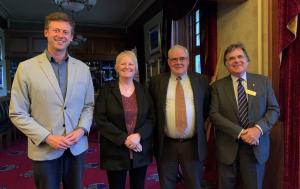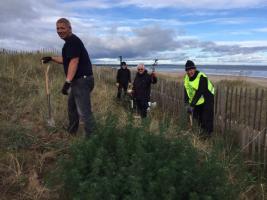Speaker Fiona Corner, Dementia Dog Project
Tue, Oct 16th 2018 at 7:00 pm - 8:30 pm

A warm welcome from President John Spittal to guest Rotarian Jack Jascoll, visiting from Lancaster Rotary Club, Pennsylvania, USA, with his wife Dorie.
Jack gave a brief rundown on the fund-raising and community support work carried out by his home club.
Then it was time for President John to explain the presence of a most unusual guest – a 2-year-old black Labrador/Retriever cross by the name of Hope.
Hope was accompanied by her training instructor Kerry Gough and by Fiona Corner, Project Manager of the Dementia Dog Project backed by Alzheimer Scotland.

Fiona Corner, John, Kerry Gough and Hope the dog
John Spittal with Hope
Fiona told an intrigued audience that Hope is one of a number if Dementia Assistance Dogs, which help owners to deal with their illness in much the same way that guide dogs can provide help to the blind.
Dementia Dogs is a pilot scheme, running only in Scotland in the UK, but with a similar scheme operating in Australia. It began in 2012, the result of a theory proposed by students at the Glasgow College of Art. The first three dogs - a world first – were placed with dementia patients in Angus in 2012. There are currently four dogs which have completed training and are available to be placed with sufferers.
Hope is one of the four. Her trainer Kerry organised a demonstration of Hope’s talents which frankly astonished the audience. She is trained to respond to sounds and motions and when a beeping alarm was triggered, Hope immediately went into action to retrieve a package of medicines from the other side of the hall, then returned them. This is precisely what a Dementia Dog would do for a dementia sufferer who may well omit to take their medication, either at the appropriate time or forget them altogether.
Other examples of the dogs’ support include opening drawers to deliver objects to their owner, reminding them when alerted to take fluids to avoid dehydration and even helping a patient to remove or put on trousers. They are also trained to provide physical and emotional support by boosting confidence, reducing social isolation or just giving the patient a friendly nudge.
Thus far in the pilot scheme, dogs are placed with couples living at home, where one person had a diagnosis of dementia and the other is their full-time carer. The dog’s harness can accept two leads, one for the patient and one for the carer, which allows them to be outdoors and walking together.
As accredited assistance dogs, dementia dogs have legal public access rights to provide support wherever their owner goes.
Another fascinating aspect of the Project is that training is based at Castle Huntly, the open prison in Angus. There, a number of the prisoners assist in the dog training. Fiona observed that this also benefited prisoners who are preparing to complete their sentences and return to the community.
The Dementia Dogs Project is keen to hear from families who could benefit from having such a dog.
They should contact Fiona Corner on 07876 848022.
Marilyn Rhind echoed the feelings of the entire group when in proposing a vote of thanks she described the project as “quite amazing” and it was wonderful to realise how much the dogs could enhance peoples’ lives.
'What We Do' Main Pages:

.jpg)


